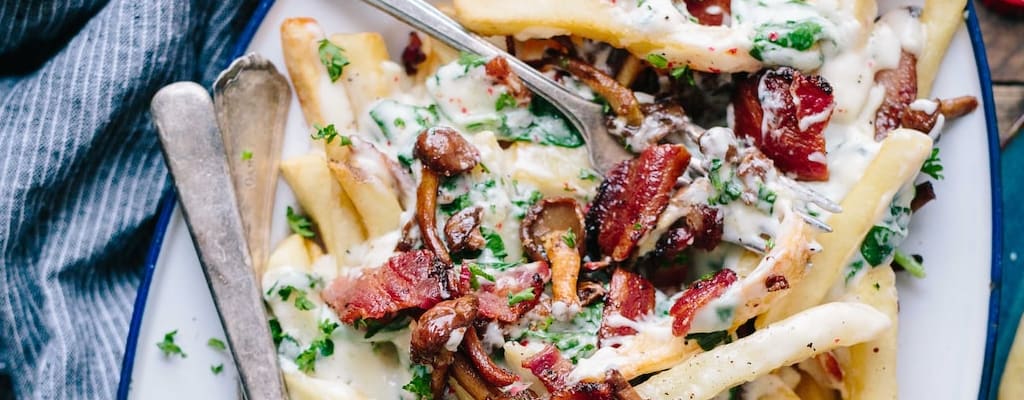prawn cocktail offensive: Idiom Meaning and Origin
What does ‘prawn cocktail offensive’ mean?
The idiom prawn cocktail offensive refers to an old-fashioned strategy used by British political parties to appeal to specific groups of voters through tailored events or policies. It originated from a popular dish called prawn cocktail, often served at such events.

Idiom Explorer
An idiom that refers to the spreading of false information or gossip about someone or something, often with the intention of damaging their reputation.
An idiom often used to describe a person who is disliked or considered bad, with negative qualities or behavior.
The idiom "red meat" refers to controversial or provocative topics that generate strong emotional reactions and often fuel arguments or debates.
The idiom "queer fish" is used to describe someone who is strange, eccentric, or unconventional.
The idiom "push the boat out" means to make a special effort or go to great lengths, often in terms of spending money or time, to make an event or occasion more extravagant or impressive.
The idiom "politically correct" refers to language, actions, or policies that are deliberately chosen to avoid offending or excluding particular groups of people, particularly those relating to gender, race, or ethnicity.
The idiom "play the race card" refers to the act of using one's race as a means to gain advantage in a situation or to deflect criticism by accusing others of racism.
The idiom "play politics" means to use strategic and manipulative tactics to gain advantage, often in a workplace or social setting.
The idiom "piss off" is a vulgar expression meaning to anger or annoy someone. It is considered rude and offensive, and is often used to express strong disapproval or frustration towards someone or something.
Prawn Cocktail Revelation
The idiom "prawn cocktail offensive" is a British expression that originated in the 1990s. It is commonly used in political and media discussions. The term "prawn cocktail" refers to a popular British appetizer that consists of cooked prawns (shrimp) served in a cocktail glass with a tangy sauce. The word "offensive" in this context refers to a planned and orchestrated PR campaign or political strategy. When used together, the phrase "prawn cocktail offensive" describes a strategic approach where politicians or public figures make calculated and often superficial gestures to appeal to a particular group or demographic.
The idiom's origins can be traced back to the 1990s when British politics underwent significant changes, particularly with the rise of New Labour and the efforts made by politicians to appeal to various sections of the public. It gained prominence during the media coverage of the 1997 general election in the UK.
The idiom has been used in various contexts, including discussions about political campaigns, public relations, and media tactics. It often implies a sense of skepticism or criticism towards the individuals or groups employing these strategies, suggesting that their actions are insincere and focused on appearances rather than substance.
One related idiom is the "charm offensive." This is a term used to describe a deliberate and friendly approach taken by someone to win over others. It involves using charisma, persuasion, and other positive qualities to create a favorable impression and gain support. The "prawn cocktail offensive" can be seen as a more cynical version of the "charm offensive," where the focus is more on the superficial gestures rather than genuine connection or meaningful policies. Despite the differences, both idioms highlight the strategic nature of political communication and the efforts made to win over public opinion.
Anothe related idiom is "politically correct." This term refers to language, policies, or actions that are designed to avoid offense or to be sensitive to specific groups or issues. While the "prawn cocktail offensive" may involve attempts to appear politically correct, the idiom itself suggests that it goes beyond the genuine intent and instead focuses on superficial gestures to manipulate public perception.
A third related idiom is "p'd off." This is a colloquial and slightly censored version of the term "pissed off," which means to be angry or annoyed. While the "prawn cocktail offensive" may not necessarily provoke anger, it can certainly lead to frustration or skepticism among some individuals who see through the superficiality of the gestures. The idiom highlights the potential disconnect between the public's expectations and the actions of politicians or public figures.
Overall, the idiom "prawn cocktail offensive" captures a specific aspect of political and media discourse, highlighting the tension between image-building and real substance. While it originated in the UK, its usage has expanded beyond British borders, demonstrating its relevance in broader discussions about public relations and political strategies.
The idiom leaves space for further analysis on the nature of political communication, the role of imagery in public perception, and the ongoing challenges of authenticity and sincerity in public life. It continues to shape conversations about the intersection of politics, media, and public relations, inviting us to reflect on the tactics employed by politicians and the dynamics between image and substance in our modern society.
Example usage
Examples of how the idiom "prawn cocktail offensive" can be used in a sentence:
1. After seeing the controversial artwork, the artist declared it a "prawn cocktail offensive" to critique the lack of depth and meaning behind it.
2. The politician's speech was deemed a "prawn cocktail offensive" by many, as it was filled with empty promises and shallow rhetoric.
3. The film received mixed reviews, with some calling it a "prawn cocktail offensive" due to its predictable plot and superficial characters.
More "Food" idioms



